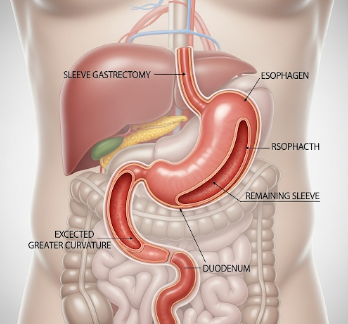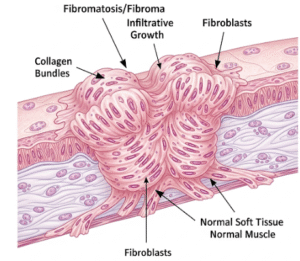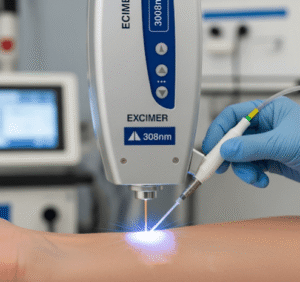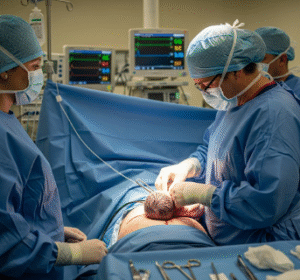Overview
Gastric Sleeve Surgery, also known as Sleeve Gastrectomy, is a type of bariatric (weight loss) surgery in which about 70–80% of the stomach is surgically removed. The remaining stomach is shaped like a narrow tube or “sleeve,” which restricts food intake and helps patients feel full faster. This procedure not only aids in significant weight loss but also improves or resolves obesity-related health conditions such as type 2 diabetes, high blood pressure, sleep apnea, and heart disease.
South Korea has become a leading destination for bariatric surgery, including gastric sleeve surgery, due to its state-of-the-art hospitals, internationally trained surgeons, and advanced laparoscopic and robotic surgical techniques. Many international patients choose Korea for safe, effective, and cost-friendly weight-loss treatments.
What is Gastric Sleeve Surgery?
Gastric sleeve surgery is a permanent weight-loss surgery that removes most of the stomach, leaving a sleeve-shaped pouch about the size of a banana.
Unlike gastric bypass, this procedure does not involve rerouting the intestines, making it less complex and with fewer long-term risks. It works through two main mechanisms:
- Restriction → The smaller stomach limits food intake.
- Hormonal changes → Removal of the part of the stomach that produces ghrelin (the hunger hormone) reduces appetite.
This surgery is typically recommended for:
- Patients with a BMI of 35 or higher.
- Patients with BMI of 30–34.9 plus obesity-related conditions (diabetes, hypertension).
- Patients who failed to achieve long-term weight loss through diet, exercise, and medication.
What are the benefits?
The benefits of gastric sleeve surgery are both medical and lifestyle-related:
- Substantial weight loss → Patients lose 50–70% of excess body weight within 12–18 months.
- Improvement or resolution of obesity-related conditions such as type 2 diabetes, hypertension, and high cholesterol.
- Reduced appetite → Hormonal changes lower hunger signals.
- Improved mobility and quality of life.
- Minimally invasive approach → In Korea, surgeries are commonly done laparoscopically or robotically.
- Shorter hospital stay and recovery time compared to traditional open surgery.
- Boost in self-confidence and mental health due to improved body image.
Procedure Details
1) How should I prepare for Gastric Sleeve Surgery?
Preparation includes both medical and lifestyle steps:
- Medical evaluation → Blood tests, chest X-ray, ECG, and endoscopy.
- Nutritional assessment → Patients meet with a dietitian to plan pre- and post-surgery diets.
- Psychological evaluation → To ensure readiness for long-term lifestyle changes.
- Medication adjustments → Stop blood thinners and certain medications as advised.
- Weight management program → Some hospitals require patients to lose some weight before surgery.
- Lifestyle changes → Quit smoking and reduce alcohol consumption weeks before surgery.
- Fasting → No food or drink for 8–12 hours before surgery.
2) What happens during the procedure Gastric Sleeve Surgery?
The surgery usually takes 1–2 hours and is done under general anesthesia:
- Anesthesia administration → Patient is fully asleep.
- Small incisions → Usually 4–5 small cuts in the abdomen for laparoscopic instruments.
- Stomach removal → About 70–80% of the stomach is cut and removed.
- Sleeve creation → The remaining stomach is shaped into a narrow tube.
- Stapling → The stomach edges are stapled to seal and create the sleeve.
- Closure → Instruments are removed, and incisions are closed.
In Korea, many hospitals use robot-assisted systems, which increase precision and minimize complications.
3) What happens after a Gastric Sleeve Surgery?
Recovery and aftercare are essential for success:
- Hospital stay → Typically 2–3 days for laparoscopic surgery.
- Post-op diet → Starts with clear liquids, then pureed foods, progressing to small solid meals over weeks.
- Pain management → Mild pain and discomfort controlled with medication.
- Activity → Light activity within a few days; full recovery in 2–4 weeks.
- Follow-up visits → Regular checkups with the surgeon and dietitian.
- Lifestyle changes → Lifelong healthy diet and regular exercise are necessary for long-term success.
Risks / Benefits
Risks
As with any major surgery, there are potential risks:
- ➤ Bleeding or infection
- ➤ Staple line leak
- ➤ Blood clots
- ➤ Vitamin and nutrient deficiencies (may need supplements)
- ➤ Acid reflux
- ➤ Nausea, vomiting, or difficulty eating large meals
Benefits
- ➤ Effective long-term weight loss
- ➤ Improved overall health and reduction of obesity-related conditions
- ➤ Shorter hospital stay and faster recovery than bypass surgery
- ➤ No intestinal rerouting, which lowers long-term risks
- ➤ High success rates in Korea due to advanced minimally invasive techniques
Recovery and Outlook
- Short-term recovery: Most patients return to work in 2–4 weeks.
- Weight loss timeline: Rapid weight loss in the first 6 months, stabilizing after 12–18 months.
- Dietary adaptation: Patients must adopt lifelong healthy eating habits.
- Long-term supplements: Vitamin B12, iron, calcium, and multivitamins are often necessary.
- Outlook: Most patients experience dramatic health improvements, longer life expectancy, and improved self-esteem.
Korean hospitals provide personalized follow-up care, including diet counseling and exercise programs, ensuring long-term weight management success.
When To Call the Doctor
Patients should immediately seek medical help if they experience:
- ⚠️ Severe abdominal pain or swelling
- ⚠️ Persistent vomiting or inability to eat/drink
- ⚠️ High fever or signs of infection
- ⚠️ Blood in stool or vomit
- ⚠️ Difficulty breathing or chest pain
Best Korea Option / Process
South Korea is one of the best destinations for gastric sleeve surgery due to its expertise and cost-effectiveness.
Why choose Korea for Gastric Sleeve Surgery?
- World-class surgeons → Specialized in bariatric and laparoscopic surgery.
- Cutting-edge techniques → Robotic-assisted sleeve gastrectomy widely available.
- High success rates → Korean hospitals have excellent outcomes for obesity treatment.
- Affordable costs → Surgery is 30–50% cheaper than in the US or Europe.
- Comprehensive programs → Pre- and post-surgery care including dietary and psychological support.
- Top hospitals:
- Asan Medical Center (Seoul) – Bariatric Center of Excellence.
- Seoul National University Hospital – Advanced minimally invasive surgery.
- Samsung Medical Center – Robotic and laparoscopic expertise.
- Yonsei Severance Hospital – Specialized weight-loss programs.
👉 For patients struggling with obesity, Gastric Sleeve Surgery in Korea offers a safe, effective, and affordable path to long-term health and wellness.













